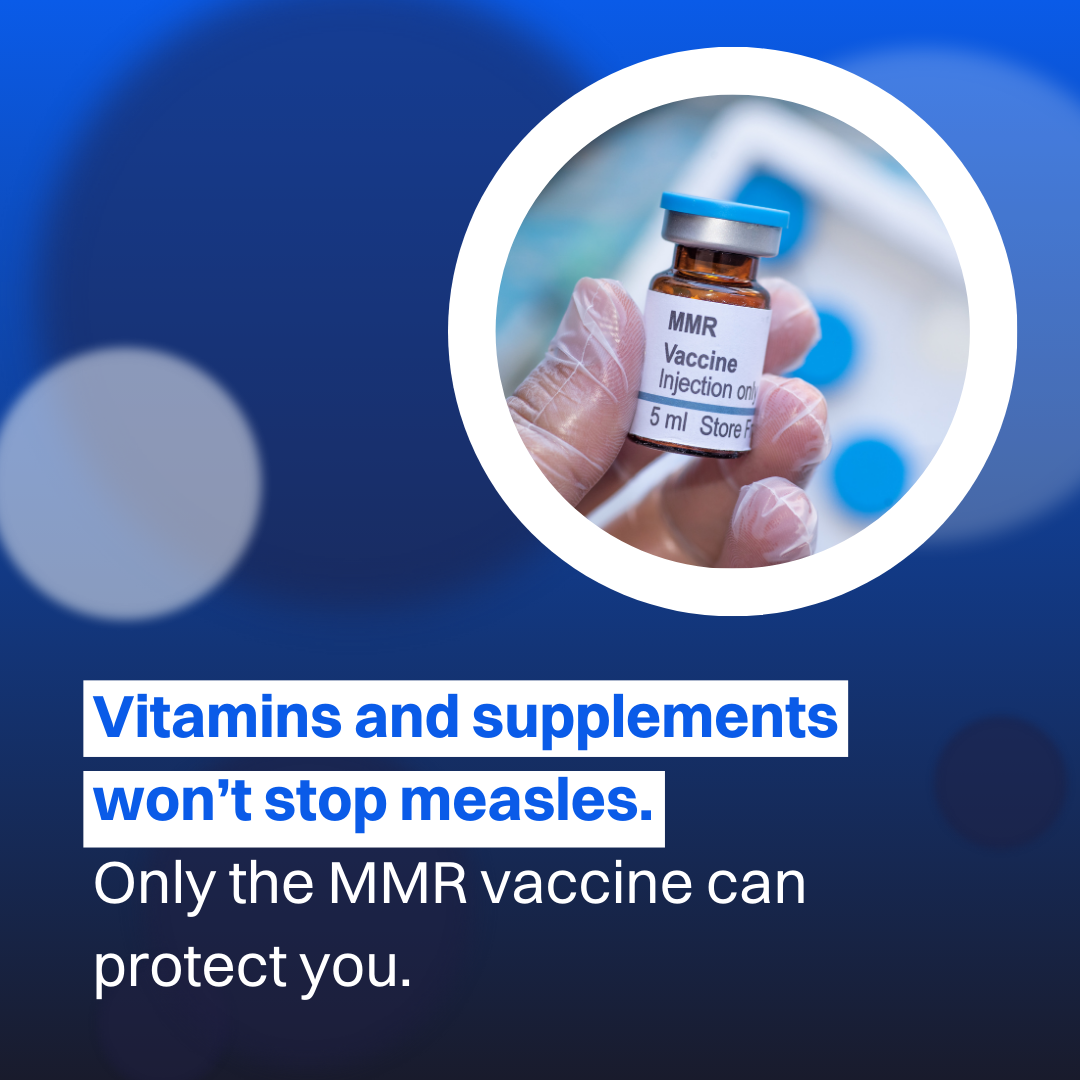Measles outbreak drives debate about vaccine safety and effectiveness
Concerns about future vaccine access at the state and federal level circulated online as ongoing measles outbreaks underscored the real-world impact of vaccine hesitancy. Many social media users repeated false claims about measles and MMR vaccines, including myths promoted by high-ranking government officials. State lawmakers introduced bills to restrict mRNA vaccine access and expand vaccine exemptions in schools, prompting discussions online. Meanwhile, social media users responded to several announcements from the federal government that spiked fears about vaccine access and hesitancy.
For even more resources, check out the menu above for real-time insights, training resources, and more. Specifically curated for people working in health care and public health, these links provide actionable content to help navigate today’s information landscape.
Trending narratives from the past month
Myths and conspiracy theories abound as U.S. measles outbreaks grow
The measles outbreak in Texas and surrounding states is fueling false narratives and conspiracy theories about the disease and the MMR vaccine. As of March 25, over 360 cases have been reported in the U.S., including 327 in Texas alone. Two people have died, the first U.S. measles deaths in a decade. HHS Secretary Robert F. Kennedy issued a “call to action” encouraging vaccination as a “personal choice” and claiming that good nutrition is a “best defense” against infectious diseases. Kennedy also promoted vitamin A to treat measles, leading some to falsely tout vitamin A as a vaccine alternative. While some social media users minimized the severity of measles as a normal childhood disease and encouraged so-called “measles parties” to expose unvaccinated children to measles, others falsely suggested that improved sanitation and hygiene—not vaccines—are responsible for declining measles rates. Some vaccine opponents speculated without evidence that the Texas outbreak was caused by a vaccine-derived measles virus, a claim that Texas health officials have conclusively disproved. Other posts repeated the myth that MMR vaccines cause autism and claimed without evidence that the vaccine has caused more deaths than measles. Read the fact checks here and here.
Social media users respond to legislation and lawsuits targeting mRNA vaccines and vaccine mandates
Proposed bills and lawsuits in several states targeted mRNA vaccines and school vaccine requirements, prompting conversation online. On February 14, President Donald Trump signed an executive order cutting federal funds to schools that require COVID-19 vaccines for enrollment, which few institutions still do. Some social media users celebrated the order, while others called for eliminating all vaccine mandates and changing the immunization schedule. Critics accused the president of pandering to false claims about COVID-19 vaccines and expressed concerns that a similar order targeting other vaccines may follow. These fears were further stoked by a February 19 British tabloid article claiming that the Trump administration plans to ban mRNA COVID-19 vaccines. At the state level, lawmakers in multiple states introduced legislation to ban mRNA vaccines and to expand nonmedical exemptions for school vaccinations. Online commenters repeated many myths about mRNA vaccine safety, including false claims that they can integrate into DNA and cause harm by “shedding.” Vaccine opponents called a New York court ruling that Amish children must comply with the state’s vaccination requirements for school enrollment an attack on religious freedom and parental rights. Read the fact checks here and here.
HHS changes fuel concerns about vaccine access and hesitancy
Recent changes at the Department of Health and Human Services have led some online to question the department’s stance on vaccines under Kennedy’s leadership. The Centers for Disease Control and Prevention indefinitely postponed an Advisory Committee on Immunization Practices meeting, causing widespread online conversations about public health and vaccine access implications. The following week, the Food and Drug Administration’s vaccine advisory committee meeting to select the viral strains for next season’s flu vaccine was canceled with no explanation or indication that the meeting would be rescheduled. Instead, the agency convened an internal group of experts to make flu vaccine recommendations without the usual input from independent vaccine advisors. Some online conversations suggest that people who might otherwise be inclined to get vaccinated may lack confidence in federal health guidance from the current administration. Finally, an HHS spokesperson confirmed on March 8 that the CDC will investigate whether vaccines cause autism, a link that has been thoroughly researched and disproven over the last three decades. Online, experts and critics highlighted the many large-scale studies showing there is no link between autism and childhood vaccines, calling the new study a “waste of time and money.” Some speculated that the study would be conducted by anti-vaccine and non-CDC researchers, while others claimed without evidence that research proving the link has been “suppressed.” Read the fact checks here and here.
What you might say in response
Measles can cause severe health problems and even death. Vitamins and good nutrition are not a substitute for vaccination.
- Measles spreads easily and is a potentially life-threatening disease. The measles virus can wipe out existing immunity, making children more susceptible to infections in the future.
- Unvaccinated children are at extremely high risk of contracting measles during an outbreak. Allowing a child to catch measles to gain “natural immunity” puts them at unnecessary risk.
- Vaccination is the only way to prevent measles. Two doses of the MMR vaccine are 97 percent effective against measles infection. While good hygiene, a healthy diet, and other lifestyle choices may improve overall health, they are not a substitute for vaccination.
- Vitamin A does not prevent measles infections. The vitamin is used in developing countries to reduce measles severity in children with existing vitamin A deficiencies.
Vaccines protect individuals and communities by preventing deadly disease outbreaks.
- Vaccines empower parents to protect their children against deadly diseases that previous generations were powerless to prevent.
- Research shows that school vaccine requirements lead to higher immunization rates, reducing the risk of vaccine-preventable outbreaks.
- Scientists have worked for decades to make mRNA vaccines safe and effective. Billions of people have safely received mRNA vaccines over the last four years, with no signs of widespread health concerns.
Routine vaccinations are a vital part of public health that keep us all safe.
- Vaccines protect against diseases that can cause serious illness, lasting health issues, expensive hospitalizations, and death. Skipping recommended vaccinations is not worth the risk.
- Everyone benefits from vaccination, including those who cannot be vaccinated and those who don’t fully respond to vaccines.
- Every vaccine recommended by the CDC has undergone multiple rounds of testing and years of monitoring to ensure its safety.
What we’re reading
- The Guardian: Formerly anti-vax parents on how they changed their minds: ‘I really made a mistake’
- The Washington Post: NIH to terminate or limit grants related to vaccine hesitancy and uptake
- NBC News: How the anti-vaccine movement weaponized a 6-year-old's measles death
Studies and trainings
- AJMC: COVID-19 Vaccine Politicization Fueled Hesitancy, Impacted Vulnerable Groups
- Annenberg Public Policy Center: How a ‘Conspiracy Mindset’ Promotes Acceptance of Vaccine Misinformation, and How to Counter It
Interested in learning more about how to debunk false claims with patients? Check out the new Infodemiology Training Program. In videos that range from 5 to 10 minutes each, the program introduces health care providers to the basics of infodemiology and provides you with actionable skills to help improve patient care. Get started today.
Quick response media assets
Below, we've provided a social media asset in English and Spanish. Use these assets on social media to help provide your network with accurate information. Just right-click the asset, or press and hold on mobile, to download.

Proposed social copy:
The measles outbreak in Texas and surrounding states shows the risk of skipping vaccines. Measles can be deadly, but it’s also completely preventable. Getting vaccinated is the only way to protect against measles.

Publicación propuesta:
El brote de sarampión en Texas y los estados circundantes demuestra el riesgo de saltarte las vacunas. El sarampión puede ser mortal, pero también es completamente prevenible. Obtener la vacuna es la única manera de protegerte contra el sarampión.
The Health Care Infodemiology Brief is brought to you by PGP, the health care leadership of the Trusted Messenger Program, and infodemiology.com’s sponsors and partners.
